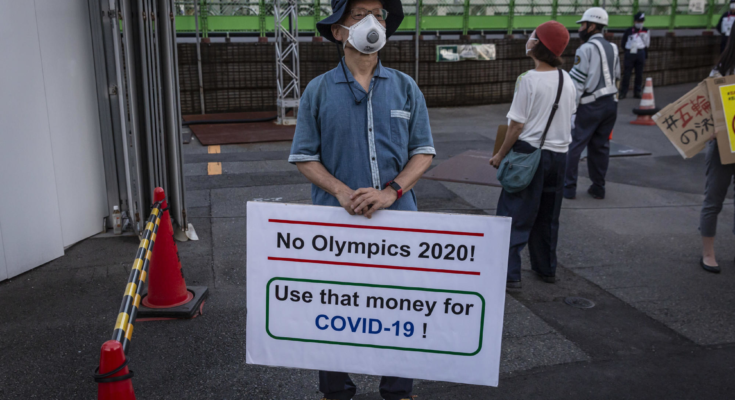It’s one week until the Opening Ceremony of the Tokyo Olympics, so let’s see how things are going …
Well, COVID-19 cases in the Japanese capital on Friday were up 55 percent from the week before, which is the 27th consecutive day of week-over-week increases as the Delta variant becomes more common.
“The speed [of increase] is very rapid,” Tokyo Gov. Yuriko Koike said at a news conference, according to Japanese media reports.
Oh, and logistical bottlenecks at airports — all incoming passengers (even Olympic athletes) must go through a maze of testing and protocols — has caused five- and six-hour backups. That headache has prompted the government to ask airlines to halt new bookings in an effort to ease the crush. The limit of non-Olympic passengers who may arrive could reach as low as 2,000 nationwide, according to Japanese media.
Meanwhile, as the government orders bars to shutter, limits the hours of restaurants and encourages locals to remain home from work or play, approval ratings in Tokyo for Prime Minister Yoshihide Suga’s cabinet plummeted to 28 percent (with a 63 percent disapproval rating).
“Having made it through 2020, retailers will now have to rely on further government support to account for continuing lockdown restrictions to account for lost income and salaries,” said Patrick Kinch, an analyst for GlobalData, a London-based data and analytics firm.
GlobalData estimates the lack of fans at events will constitute an $800 million loss for the Tokyo organizing committee alone. Ancillary businesses will miss out on billions more.
So, that’s not great. And the Japanese are aware of it.
A full 50 percent of Tokyo residents said the Olympics should still be canceled, according to the Japan News. A recent poll by Ipsos found opposition nationwide hitting 78 percent. Some 73 percent in Tokyo said the current state of emergency won’t be effective with many citing the fact that local businesses have been crushed, all so a big international event can continue.
Lockdown fatigue is real … yet continuing.
“I want people to consider again the option of working remotely, in view of a large number of infections at workplaces,” Tokyo Gov. Yuriko Koike said.
As for the competition itself, who the heck knows?
Tracing. Testing. Everything is at peril. Just this week positive tests or close contact classifications have hit groups as diverse as the Kenyan women’s rugby team and workers at a hotel housing the Brazilian judo team.
The U.S. men’s basketball team, which remains incredibly popular around the world and especially in hoops-mad Asia, is already reshuffling its roster due to COVID and, perhaps, a prolonged NBA Finals, which, of course, occurred because of COVID.
Each of the 11,000 athletes will be required to live a comparatively spartan existence — lots of isolation, meals in rooms and other precautions — just so they might be able to compete.
Other than that, everything is great.
There are plenty of reasons to sympathize with the Japanese. The 2020 Olympics were shaping up to go off without a hitch — a rarity for an event that is routinely rife with mismanagement, cost overruns, corruption and incompetence.
The country kept new construction to a minimum. When necessary, it built temporary facilities or ones that could be repurposed after the Games. Due to the wealth and technological savvy of Tokyo, and the considerable planning of the local organizing committee, this was expected to go smoothly.
IOC President Thomas Bach repeatedly labeled Tokyo as “the best-ever prepared city for the Olympic Games.”
This was a point of pride for the country, which has long been obsessed with the Olympics. Japan’s per-capita television ratings for the Games almost always rank near the top of all countries. Its hosting of the 1964 Summer Games was seen as a watershed moment that rebranded the country after World War II as a modern, friendly, business-minded nation.
Besides, this was a chance for Japan to grab the global spotlight in between the hosting of the 2018 and 2022 Winter Olympics by neighbors and, in different ways, rival countries South Korea and China, respectively. Television footage of everything from Mt. Fuji, to historical sites, to lively entertainment districts in Central Tokyo would have been beamed around the globe.
Team Japan, which numbers a national record 582 athletes, was expected to thrill local fans.
Then COVID hit and the two main reasons to host the Olympics — goodwill and good money — are either going or gone.
First, the 2020 Olympics became the 2021 Olympics. Then slow vaccine approval and rollout caused the virus to be an even bigger deal than it would have been in the West (disapproval for the government on that issue is particularly high on this issue).
Now the country is scrambling to somehow make this work under extreme pressure. While new cases are still relatively low in raw numbers (1,271 on Friday in Tokyo), they are exploding as a percentage (822 the week before).
And that’s before the Games have even begun. The influx of Olympics visitors at the nation’s five major airports isn’t expected to peak until Sunday and will remain high deep into next week. Various predictions have cases topping 2,000 or even 3,000 daily in Tokyo during the Olympics, a reason for fear among parts of the largely un-vaccinated populace.
At this point, though, there is no turning back. One week from now, the cauldron will be lit — during a scaled-back Opening Ceremony inside a near-empty $1.3 billion stadium. Perhaps, then, the mood will change.
“When the athletes finally compete, this will be well-appreciated here by the Japanese people,” Bach said.
Or so he hopes.
More from Yahoo Sports:


